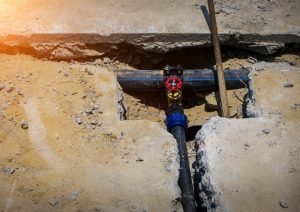 As a plumber, we’ve dealt with countless leaks and clogs. Often times, all it takes is a quick repiping or a simple hydro-jetting to fix those problems. But a simple leak in the wrong place can make all the difference.
As a plumber, we’ve dealt with countless leaks and clogs. Often times, all it takes is a quick repiping or a simple hydro-jetting to fix those problems. But a simple leak in the wrong place can make all the difference.
In this post, we’ll go over three plumbing problems that can cause substantial damage if not taken care of immediately.
Slab Leaks
Leaks are bad, sure, but slab leaks are the worst. A slab leak is simply any leak that happens below the foundation of your home. Of course, it’s nothing more than a simple leak, but the location makes all the difference.
Slab leaks often manifest in the worst ways: cracks in your walls or tile flooring, warped wood flooring, damp or soggy carpet, or wet spots in your yard. This happens because the leak causes the soil above it to expand, which then shifts the placement of the foundational concrete slabs. If not taken care of immediately, they’ll continue to drive up your water bill and create more damage in your home.
Other ways to detect slab leaks include listening for running water or feeling for warm spots on the floor. It’s not uncommon for pets to lay on these hot spots, so you should pay attention to their behavior if you suspect a slab leak.
Sewer Line Breaks
Actually, we were wrong… Sewer line breaks are truly the worst. A broken sewer line isn’t just your average leak; it can be a serious detriment to your health.
Sewer line breaks can happen somewhat like slab leaks, under your home or out in your yard. In these cases, you might find the yard has become soaked with foul-smelling sewage water. It’s also possible, however, that these leaks can happen inside your home. Burst pipes are one way, but it can also come from faulty seals around the toilets and pipe connections.
Unpleasant smells and stains around your home could be the result of a seeping or leaking sewer line. Be sure to call a plumber in Clifton, NJ at the first sign of a broken sewer line.
Corrosion
Corrosion isn’t the worst on this list, but it’s a slow-acting terror that will eventually cost you a hefty sum if it isn’t taken care of properly.
Pipes can begin to rust and corrode due to high acidity in the water, as well as from the soil and environment around them. For example, copper pipes above ground can corrode if there are too many volatile organic compounds (VOCs) in the air, such as those from formaldehyde found in cleaners.
Corrosion comes first, and then the leaks will follow shortly after. If the corrosion is caused by your water, you’ll want to call in a professional to discuss possible water treatment systems. Otherwise, the water will only continue to create corrosion in pipes around the home.
Signs of corrosion usually include:
- Discolored water, due to flakes of rust.
- Lowered water pressure from the leaks.
- Strange tastes in the water.
Need a plumbing repair? We’re always open! Contact MarGo Plumbing Heating & Cooling Inc. today.
